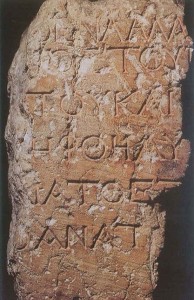Two Days and a Wakeup
It’s Tuesday of Passion Week. Below you’ll see a timeline that’s available from biblegateway.com that follows the collective story told by the gospels as far as Christ’s activities leading up to the trial on Thursday nite and the crucifixion which would happen at 9:00 on Friday.
What’s amazing to me is that Christ’s calendar wasn’t random. When you look at all of what transpired, there’s an enormous amount of spiritual / prophetic significance attached to every event.

Fragment of stone originally positioned at the entrance to the Temple warning Gentiles not to enter the Temple under pain of death. (Archeology of the Bible)
Sunday
The first day of the Jewish week is actually Sunday. Sunday became the “sabbath” for Christians in light of it being the day the Christ rose from the grave (see Acts 20:7). Today’s the day Christ came riding into Jerusalem on a donkey. From our perspective, that might look a little strange, but it resonated as a declaration of royalty to anyone living in that culture (1 Kings 1:33). The thing that made it profound is that Zechariah predicted it in Zechariah 9:9.
As a quick aside, some get distracted by the way in which the gospel writers will sometimes document the same event differently. For example, Matthew references two donkeys, the colt that He actually rode on and its mother. Mark, Luke and John all refer only to the “foal” that Jesus rode upon as He made His triumphant entry into the City of David. It’s not a conflict as much as it’s a situation where Matthew provides more detail than the other writers. Fact is,it would’ve been typical for the mother to walk ahead of the colt that had never been ridden before to provide some emotional stability for the foal given the noise of the crowds etc.
Thing is, Jesus’ grand entrance wasn’t acknowledged by only a few eccentrics. The Jews knew Who He was. Even if they didn’t understand His Divinity, by this point His Name was well known given the way in which He had taught and miraculously healed on so many occasions. He was a phenomenon. Couple that with the way in which some wanted His popularity to translate into a political deliverer, His star was definitely on the rise. When you look at the way John describes the scene in John 12:17-19, it’s a spectacle and it wasn’t until after He had risen from the dead that his disciples would be able to look back on what had happened and realize that this wasn’t so much a well received assertion of Christ’s claim to the throne of David, it was an intentional and a very public fulfillment of prophecy.
Monday
Monday Jesus continues to make a statement that reverberates with substance the more you study the symbolism of what He was doing. The highlight today is Jesus walking into the temple and driving out those who were seeking to make some money by offering for sale the animals that a Hebrew would need in order to offer up a lawful expression of worship. It’s one thing to offer a resource as a service, but’s another to exploit another’s need in order to facilitate a personal gain. It was just one more indicator of Israel’s spiritual depravity and the fact that it was happening in God’s House made it all the more offensive to the Son of God.
The Temple was indeed the place where God had “placed His Name” (1 Kings 9:3), but many Jews in their hearts had willfully rebelled against Him by replacing the Authority of God with the Temple itself – a representation of God. Israel’s false sense of security and blatant disregard for God’s Word had been identified by multiple prophets and ultimately punished by God via the Babylonians (2 Chron 36:15-19). The city was sacked and the Temple was totally destroyed.
Years later, a Second Temple was constructed under the supervision of Zerubbabel and then renovated by King Herod during his administration. This was the Temple that existed during the time of Jesus. But the problem of it being embraced as a substitute for personal piety persisted. That Temple would be destroyed as well. This time God’s instrument would be the Romans under Titus – an event Jesus describes in Matthew 21:6. In this instance, however, God’s allowing His House to be destroyed was also symbolic in that His dwelling was now in the hearts of men as opposed to an imposing structure with limited access.
This isn’t the first time that Christ got angry with the commercialization of worship that was going on in the temple. John reports a similar event in chapter two of his gospel (Jn 2:12-17). At that point, He made a whip and drove all the animals out of the temple area and did it a way where His motivation was understood as being a holy zeal for the sanctity of God’s House .
Now it’s three years later and while the actual event is recounted a bit differently by the gospel writers, the message is the same but with even more prophetic substance. Matthew and Luke state that Jesus went to the temple immediately after making His grand entrance into the city. But Mark offers more detail by stating that while Jesus did go to the temple after His grand entrance into Jerusalem and saw what was going on, it wouldn’t be until the following day when He would repeat His performance of cleansing the area, only this time He would quote Isaiah 56:7 and Jeremiah 7:11.
In John, the disciples recognized His actions as being a manifestation of Psalm 69:9 (“zeal for my house will consume me…”). But this time, Jesus referring to the passage in Isaiah emphasizes not only the appropriate, prayerful tone of the church, but the fact that “all nations,” and not just the Jews, will be beneficiaries of God’s grace. In addition, the seventh chapter of Jeremiah emphasizes the pointlessness of false religion which is the natural outcome of a person defining their personal piety as being present at the Temple, rather than obeying and worshiping the God of the Temple. That problem would be solved by God establishing His home in the hearts of men through the Holy Spirit – a solution facilitated through the death and resurrection of His Son.
Do you see what’s happening here?
Jesus isn’t just randomly quoting bits and pieces of Scripture. He’s bringing in passages that give context to the current situation so that the events that are getting ready to unfold in the next couple of days can be better understood and appreciated as a fulfillment of prophecy and the validation of a supernatural event that would change the very fabric of the human experience.
Tuesday – Two Days and a Wake Up
Luke 21:37 says:
Each day Jesus was teaching at the temple and each evening he went out to spent the night on the hill called the Mount of Olives, and all the people came early in the morning to hear him at the temple. (Luke 21:37)
Jesus was not letting any opportunity to teach and to influence others slip away. Given the weight of anxiety that was weighing on Him, knowing that in a matter of days (two days and a wake up), He would be enduring some excruciating pain, that says a lot for His mental disposition – that He would still be that committed to serving those that would be demanding His death in less than 48 hours.
C.S. Lewis coined the phrase “Liar, Lord, or Lunatic” as a way to illustrate the only options one has when considering the Identity of Christ. The only option that makes any real sense is “Lord,” simply because in order for Him to be a liar, He would have to be outrageously evil given the way in which He taught others to trust Hm for their temporal fulfillment as well as their eternal destiny. Plus, He would’ve been a fool because He died for a lie knowing that it was a lie. Christ’s sanity is beyond question. The way in which He reasoned and responded to the greatest religious minds of the day, the mental disposition He maintained in the midst of horrific circumstances makes the idea of Him being anything less than sane utterly ridiculous.
An example of His being amazingly “sharp,” as far as His mental faculties is concerned can be found here, on Tuesday. While He was in the temple courts teaching, He was approached by the Pharisees who were looking for any opportunity to trap Him in a way that could justify arresting Him and putting an end to His Influence. They asked Him about paying taxes to Caesar, knowing that if he “slipped” just a little bit, as far as saying anything against the Roman government, they could arrest Him as an insurrectionist. His saying “Give to Caesar what is Caesar’s, and to God what is God’s” was a brilliant response in that was utterly correct and at the same time deftly strategic in the way it shut down the Pharisees’ attempt to corner Him (see Matt 22:18-22).
Here Everything is Extraordinary
Jesus said in John 20:29:
Then Jesus told him, “Because you have seen me, you have believed; blessed are those who have not seen and yet have believed. (Jn 20:29)
I would like to hope that if I had seen Him and listened to Him, I would’ve been among the few that would not be clamoring for His death in a couple of days. I want to believe that, but I don’t know.
Isn’t it amazing?
There was a day when you could’ve sat down with someone and listen to them describe what the sand felt like between their toes as they walked across the dry ocean bed of the Red Sea. You would’ve noticed a change in the look on their face as they recounted the appearance of God’s fire hovering over the tabernacle at night. Fast forward several centuries later and you could’ve talked to that person who had been blind since birth and, after being miraculously healed by Christ, could tell you what it was like to see the color blue for the first time.
You read about these things, but it’s sometimes easy to forget that they actually happened. There was a time when you could’ve made eye contact with Jesus and you could hear the way His Voice sounded as it echoed over the area where crowds had gathered to hear Him speak. You could’ve heard the masses shouting “Hosanna” as Jesus made His way into Jerusalem and you could’ve heard some of those same people demand that the individual Who they were honoring a few days ago be put to death.
The smell of salt in the air that lingered around the area of the Sea of Galilee, the foreboding vibe that surrounded Golgotha and the deafening roar of the crowds voicing their convictions as Pilate struggled to decide Jesus’ fate.
When you pause long enough to capture the practical realities of what actually occurred, it’s almost unsettling because of the way it brings into focus the distinction between the way we typically view ourselves from the perspective of what’s normal and expected and the way things are truly ordered according to a spiritual paradigm.
And standing center stage is Jesus.
That’s the Lord.
Napoleon Bonaparte was once quoted as saying:
I know men; and I tell you the Jesus Christ is not a man. Superficial minds see a resemblance between Christ and the founders of empires, and the gods of other religions. That resemblance does not exist. There is between Christianity and whatever other religions the distance of infinity…Everything in Christ astonishes me. His spirit overawes me, and His will confounds me. Between Him and whoever else in the world, there is no possible term of comparison. He is truly a being by Himself. His ideas and sentiments, the truly which He announces, His manner of convincing are not explained either by human organization or the nature of things…The nearer I approach, the more carefully I examine, everything is above me – everything remains grand, of a grandeur which overpowers. His religion is a revelation from an intelligence which certainly is not that of man…One can absolutely find nowhere, but in Him alone, the imitation or the example of His life…I search in vain in history to find the similar to Jesus Christ, or anything which can approach the gospel. Neither history, nor humanity, nor the ages, nor nature, offer me anything which which I am able to compare it or to explain it. Here everything is extraordinary.1
That’s the Lord, teaching and healing. That’s the Lord debating with the Pharisees and playing with the kids in the street. That’s the Lord remaining silent before Pilate and that’s the Lord hanging on a cross, enduring an outrageous amount of pain and dying for me.
That’s the Lord.
Here, everything is extraordinary.
Click here to read “One Day and a Wake Up!”
1. “Evidence That Demands a Verdict”, Josh McDowell, Here’s Life Publishers, San Bernardino, CA, 1972, p 106









Leave a Reply
Want to join the discussion?Feel free to contribute!